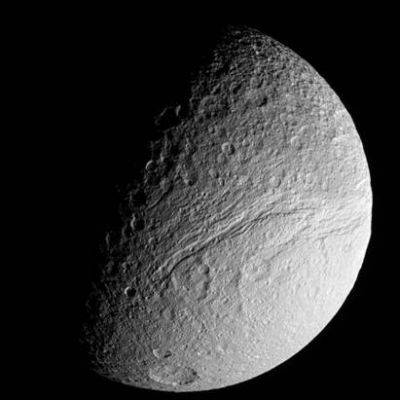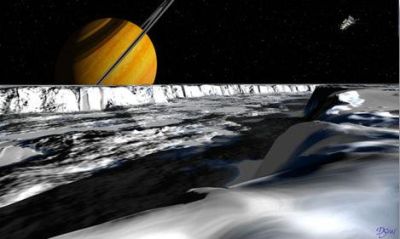30 June 2008

NASA/JPL/Space Science Institute
NASA’s Jet Propulsion Laboratory (JPL) recently published an image of Tethys, a bizarre Saturnian icy moon. The image was acquired by the Saturn-bound Cassini spacecraft. The image is an exquisite view of a magnificent rift on Tethys, known as Ithaca Chasma.
Ithaca Chasma is 100 km wide, 3 to 5 km deep and 2,000 km long, extending approximately three-fourths of the way around the circumference of Tethys. It is named after the island of Ithaca, in Greece.
Ithaca Chasma is believed to have formed in an early stage of Tethys’ evolution, when the moon’s interior cooled, causing its surface to fracture. This unusual geologic feature is also probably related to a gigantic impact crater located on Tethys.

An artist’s impression of Ithaca Chasma
Credit: NASA/JPL
The image was taken in green light with Cassini’s narrow-angle camera on 10 May 2008. The Saturn orbiter was at a distance of approximately 183,000 km from. Image scale is 1 km per pixel.
Tethys (1,062 km across) orbits Saturn every 1.9 days, in a circular orbit of a radius of approximately 295,000 km. Like our Moon (3,476 km across), Tethys keeps the same side turned to its parent planet, but our Moon orbits Earth every 27.3 days. Interestingly, two tiny moons share Tethys its orbit. In Greek mythology, Tethys was a sea goddess and a sister of Cronus (Saturn).
Further Reading
Cassini-Huygens Mission to Saturn
http://saturn.jpl.nasa.gov/home/index.cfm
Aymen Mohamed Ibrahem
Senior Astronomy Specialist